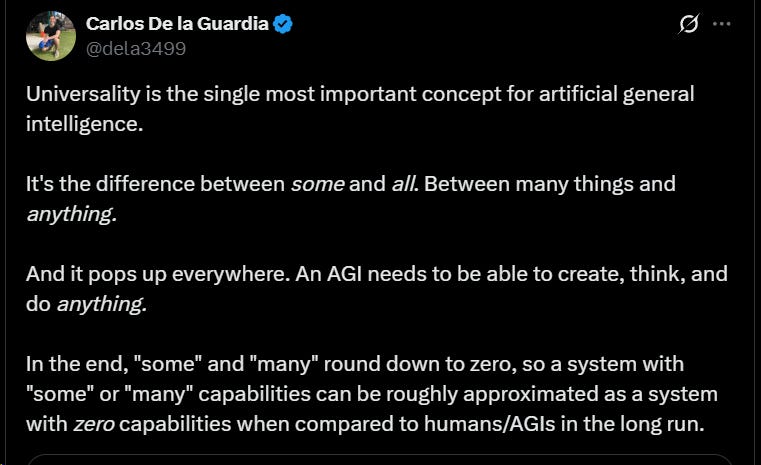The Universality Misconception in AI
Why Literal Universality Misses the Mark
There's a seductive idea circulating among some AI thinkers, popularized notably by David Deutsch, that universality—the theoretical capability of explaining literally anything—is the single most critical threshold separating artificial general intelligence (AGI) from mere specialized or narrow AI.
A recent example claims explicitly that "in the end, 'some' and 'many' capabilities round down to zero," suggesting that only systems capable of universal explanation matter in the long run, effectively relegating specialized AI capabilities to insignificance when compared with humans or AGI.
This statement is provocative but deeply misleading.
Intelligence Exists on a Continuum, Not a Binary Scale
Firstly, intelligence and capability exist along a continuous spectrum. On one end are extremely narrow, domain-specific AIs (like chess engines). On the other, there's the idealized "universal explainer"—capable, in theory, of comprehending and solving any problem that can be formulated. Humans occupy a position high on this spectrum, profoundly general but certainly not literally universal due to intrinsic biological constraints like finite memory, attention, computational speed, and lifespan.
Why Literal Universality is a Misleading Ideal
Literal universality—the ability to handle infinite complexity without limit—is practically impossible for any physically finite system, human or artificial. Deutsch's universality, while philosophically intriguing, is an idealized limit rather than a realistic benchmark.
Thus, if literal universality were strictly required for general intelligence, not even humans would qualify.
Specialized Capabilities Do Not Round to Zero
The claim that partial or specialized capabilities round down to zero is demonstrably false. Even if AGIs eventually emerge, specialized AI systems will retain significant utility, efficiency, and economic value. For instance:
Advanced specialized AI, like medical diagnostic systems or financial analytics, clearly hold lasting and substantial practical value.
Such systems remain capable of tasks that they perform with superhuman precision, speed, or cost-effectiveness.
Even compared directly to future AGIs, their capabilities do not vanish; they persist meaningfully, simply with diminished relative importance.
In short, "some" or "many" capabilities are absolutely not negligible—they represent genuine, lasting, and often indispensable forms of competence.
A More Accurate Picture: Pragmatic Generality
Real AGI development targets not absolute universality but pragmatic generality. An AI must be general enough to handle a wide range of open-ended problems through adaptive learning, creativity, and explanatory understanding. But it needn't (and can't) be literally universal.
Humans already provide the definitive proof of this concept. Our general intelligence is extraordinarily broad but clearly finite. Yet it's precisely this pragmatic generality—not an impossible universality—that has allowed humanity to thrive and innovate so profoundly.
Conclusion: Rejecting False Dichotomies
The notion that "some" capabilities equal zero is a rhetorical overstatement obscuring a crucial reality: the value and nature of intelligence lie on a spectrum of generality. Literal universality is an instructive ideal, not a practical threshold. Both humans and AI systems achieve meaningful generality without it. Recognizing this nuance is essential for clear and productive discussions about artificial intelligence's present and future.


